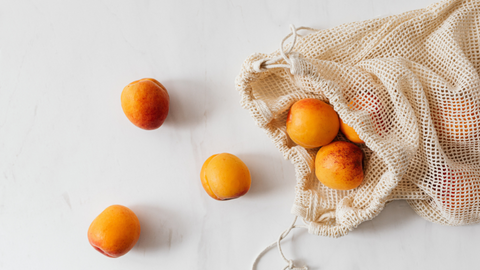This year marks the British Nutrition Foundation’s 10th Healthy Eating Week, taking place from 13-17th June 2022. This year’s theme is Eat well for you and the planet - aiming to educate people on having a healthier and more sustainable diet, by making simple changes to their lifestyle.
Read on to find out the British Nutrition Foundation’s 5 simple steps towards a healthier you, and a healthier planet.
Focus on fibre - for meals and snacks
Fibre is a type of carbohydrate that our bodies can’t break down, so it passes all the way through our digestive system. This makes it essential for healthy digestion and for keeping our gut healthy. It’s recommended that we eat around 30g of fibre a day, however most adults only eat around 18g per day – meaning there’s a long way to go to reach the recommended amount, and the health benefits that go with it.
There’s lots of easy ways to increase your fibre intake throughout the day, by making simple swaps to your meals and snacks. For example, wholemeal bread has around 3 grams of fibre per slice, compared to only 1 gram in white bread - meaning this simple swap could more than double the fibre intake that you would usually get from your sandwich or toast. Opting for wholewheat pasta and brown rice rather than white has the same effect, making it super easy to boost the fibre content of your favourite meals.
Get at least 5 a day - put plenty on your plate
We all know that we should be eating at least five different fruits and vegetables a day - and rightly so, as research shows that increasing our intake can decrease our risk of serious health problems. The best way to ensure you’re eating enough fruit and vegetables is to include them in every meal and snack – ideally as half of the plate.

Instead of reaching for crisps, why not try snacking on crunchy crudites like carrots, celery and cucumber – pair these with your favourite dip, such as houmous or salsa. Adding more chopped veggies such as peppers and courgette to your favourite pasta dish could not only help you on your way to 5 a day but will also bulk the meal out and help you to feel fuller. Importantly, a portion of fruit or vegetables is considered to be 80 grams - so always aim for this amount, and don’t forget that the more variety and colour you can include, the better!
Vary your protein – be more creative
Many of us associate protein with meat, however, we can actually get all the protein that we need from plant-based sources, and these also tend to be lower in saturated fat and higher in fibre – win, win! What’s more, growing pulses can help the health of our planet by improving the health of the soil and reducing the need for fertilisers.
It's easy to be more creative with your protein choices, and it doesn’t mean you have to wave goodbye to meat. Why not try swapping half the meat in meals such bolognese or chilli con carne for pulses such as lentils or beans – not only would this pack the meal with more nutrients, it would also make it more cost effective. Opting for nuts as a snack is a great way to boost your plant-based protein intake and keep you feeling satisfied in between meals. Nuts are also a good source of fibre and micronutrients - in fact, just one Brazil nut contains your daily intake of selenium!
Stay hydrated – fill up from the tap
Good hydration is one of the most important aspects of our diet - over half of our bodies are made up of water, so it’s vital that we keep our fluid levels topped up to allow our bodies to function optimally. We should aim to drink 1.5 to 2 litres of water a day to ensure adequate hydration.
Investing in a reusable water bottle is one of the simplest things we can do to help us and the planet. Keeping the bottle with you reminds you to keep sipping throughout the day and makes it easy to keep track of whether or not you’re drinking enough. Having a reusable bottle also means you won’t need to buy a single-use plastic bottle of water when you’re on the go – helping towards a plastic free lifestyle and saving you money too.

Reduce food waste – know your portions
When it comes to reducing the amount of food that you waste, how you portion and serve it can have a much bigger impact than you may think. Understanding portion sizes can not only help you to buy and cook the amount of food that you need (saving money!) but can also help to prevent overestimating portion sizes and overeating.
The best way to understand portion sizes is to measure them – food packaging indicates how much a portion should be, so measuring this out with your kitchen scales will stop you from misjudging the correct portion size. Once food is cooked, serving smaller portions (using a smaller plate can help with this) and coming back for seconds if you’re still hungry can prevent any waste from our plates going in the bin.
Eat well for you and the planet
Making these simple changes can help you to have a healthier and more sustainable diet. The healthiest diet that we can have is one that provides our bodies with all the nutrients that it needs. Take our 20 second quiz to find out if you’re getting enough of the essential nutrient iodine and find out how our sustainable seaweed supplements could improve your health.

